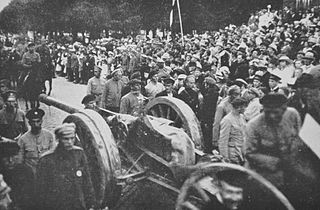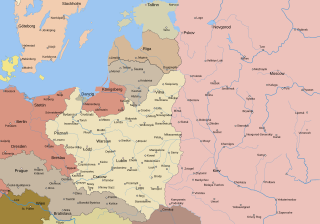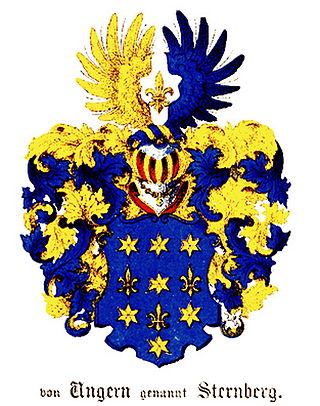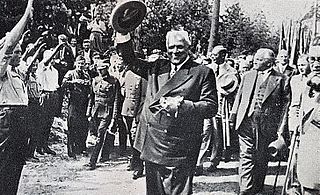| Origin | |
|---|---|
| Word/name | German |
| Meaning | "man from Ulm" |
| Other names | |
| Variant form(s) | Ullmann, Ulmann, Ullman, Ulman |
Ulmanis (feminine: Ulmane) is a Latvian surname of German origin (from German surname Ullmann). Individuals with the surname include:

Kārlis Augusts Vilhelms Ulmanis was a Latvian politician. He was one of the most prominent Latvian politicians of pre-World War II Latvia during the Interwar period of independence from November 1918 to June 1940. He served four times as prime minister, the last time as the head of an authoritarian regime, during which he subsequently also adopted the title of President of Latvia. The legacy of his dictatorship continues to divide public opinion in Latvia today.

Guntis Ulmanis, also known as Guntis Rumpītis from 1949 to 1989, is a Latvian politician and the fifth President of Latvia from 1993 to 1999.
Ullmann is a German surname also associated with Ashkenazi Jews. It means "man from Ulm".

The Latvian War of Independence, sometimes called Latvia's freedom battles or the Latvian War of Liberation, was a series of military conflicts in Latvia between 5 December 1918, after the newly proclaimed Republic of Latvia was invaded by Soviet Russia, and the signing of the Latvian-Soviet Riga Peace Treaty on 11 August 1920.

After the occupation of Latvia by the USSR in June 1940, much of the previous Latvian army was disbanded and many of its soldiers and officers were arrested and imprisoned or executed. The following year Nazi Germany occupied Latvia during the offensive of Army Group North. The German Einsatzgruppen were aided by a group known as Arajs Kommando in the killing of Latvian Jews as part of the Holocaust. Latvian soldiers fought on both sides of the conflict against their will, and in 1943 180,000 Latvian men were drafted into the Latvian Legion of the Waffen-SS and other German auxiliary forces.

The House of Ungern-Sternberg is an old and influential Baltic-German noble family, with branches belonging to the German, Finnish, Swedish and Russian nobility.
The Battle of Cēsis, fought near Cēsis in June 1919, was a decisive battle in the Estonian War of Independence and the Latvian War of Independence. After heavy fighting an Estonian force moving from the north, supplemented by Latvian units, repelled Baltic German attacks and went on full counter-attack.
Latvian names, like in most European cultures, consist of two main elements: the given name (vārds) followed by family name (uzvārds). During the Soviet occupation the practice of giving a middle name was discouraged, but since the restoration of independence, Latvian legislation again allows the giving of up to two given names and it has become more common to give a middle name to children.
Petersson is a Swedish patronymic surname meaning "son of Peter". There are alternate Danish, Dutch, English, German, Latvian and Norwegian spellings. Numbers in Sweden:
Kalniņš is a native Latvian-language topographic surname, derived from the Latvian word for "hill" (kalns). May also be Russified as Kalnin. Notable people with the surname include:
Freimanis is a Latvian surname of German origin. Individuals with the surname include:
Arājs is a Latvian occupational surname, derived from the Latvian word for "ploughman". Individuals with the surname include:

The Latvian Provisional Government was formed on November 18, 1918 by the People's Council of Latvia as the interim government of the newly-proclaimed Republic of Latvia during the Latvian War of Independence. The term encompasses three cabinets led by Kārlis Ulmanis, the leader of the Agrarian Union, who was chosen to be Prime Minister. The Ulmanis' government led the country until the formation of an elected cabinet after the elections to the Constitutional Assembly of Latvia in June 1920.

Vilks is a Latvian surname, derived from the Latvian word for "wolf". Individuals with the surname include:
Mucenieks is a Latvian occupational surname, derived from the Latvian word for "cooper". Individuals with the surname include:

The 1934 Latvian coup d'état known in Latvia also as the 15 May Coup or Ulmanis' Coup, was a self-coup by the veteran Prime Minister Kārlis Ulmanis against the parliamentary system in Latvia. His regime lasted until the Soviet occupation of Latvia in 1940.
Pommer is a German surname meaning Pomeranian. Notable people with the surname include:
Baumanis is a Latvian surname of German origin. Individuals with the surname include:
Kalējs is a Latvian occupational surname, derived from the Latvian word for "blacksmith". Individuals with the surname include:
Ekmanis is a Latvian surname of German origin. Individuals with the surname include: